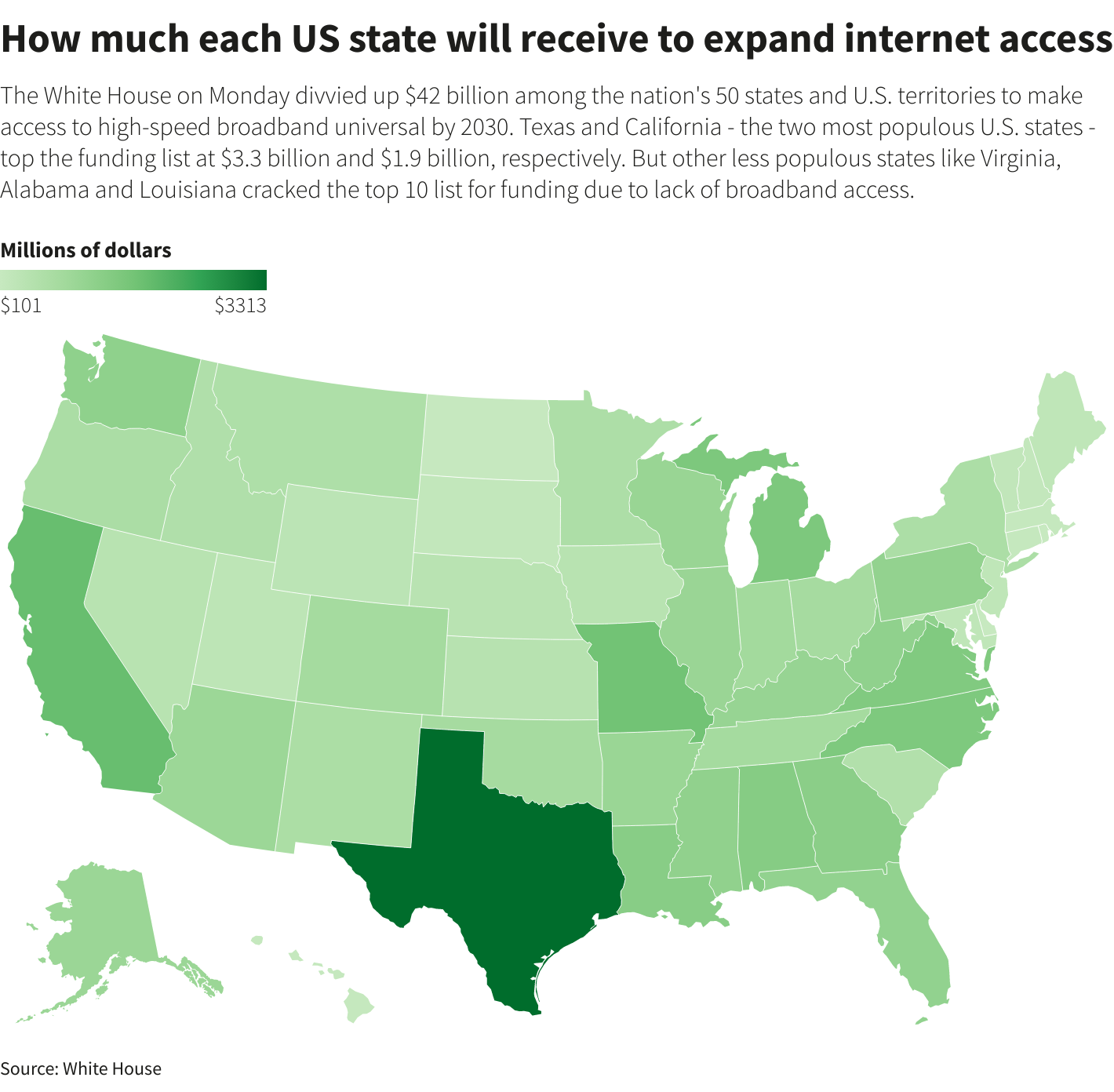WASHINGTON, June 26 (Reuters) – The White House on Monday split $42 billion among the nation’s 50 U.S. states and territories to make access to high-speed broadband universal by 2030, launching a new ad campaign for economic policies of President Joe Biden.
Funding under the Broadband Equity Access and Deployment program was authorized under the Biden-backed $1 trillion infrastructure bill of 2021. The spend will be based on a recently released Federal Communications Commission coverage map detailing gaps in access.
Texas and California, the two most populous states in the United States, top the funding list with $3.1 billion and $1.9 billion, respectively. But other less populous states like Virginia, Alabama and Louisiana made it into the top 10 in funding due to lack of broadband access. These states have large rural areas with less internet connectivity than their major cities.
“It’s the largest investment ever in high-speed internet. Because for today’s economy to work for everyone, internet access is just as important as electricity, water or other basic services,” he said Biden in a speech at the White House on Monday.
Prizes range from $27 million to US territories like the US Virgin Islands to more than $3.3 billion for Texas, with each state receiving a minimum of $107 million.
[1/7]US President Joe Biden announces a $42.45 billion national grant program for the deployment of high-speed Internet infrastructure called the Broadband Equity Access and Deployment (BEAD) program, at the White House in Washington, US, June 26, 2023. REUTERS/Jonathan Ernst
The announcement kicks off the second leg of Biden’s tour, highlighting how legislation passed when his Democratic Party-controlled Congress will affect average Americans, as his 2024 re-election bid gears up.
As part of the sales pitch, Biden will also deliver what White House officials describe as a major economic speech in Chicago Wednesday, introducing so-called “Bidenomics,” according to a Monday memo by senior advisers Anita Dunn and Mike Donilon to Democrats at the Congress and other allies.
The 2024 election will be seen in part as a referendum on Biden’s handling of the economy. Job creation and low unemployment are on the bright side, while high inflation and the knock-on effect of higher interest rates have fueled recession fears.
More than half — 54 percent — of Americans disapprove of the way Biden is delivering his job, while only 35 percent of respondents approved of his handling of the economy, according to a Reuters/Ipsos poll conducted earlier this year. month. Democrats lost control of the House of Representatives in the 2022 midterm elections.
The administration estimates that there are approximately 8.5 million locations in the United States that lack access to broadband connections.
Broadband companies such as Verizon (VZ.N), Comcast (CMCSA.O), Charter Communications (CHTR.O), and AT&T (TN) have been reluctant to provide access to low population rural communities because investments are expensive and the regions don’t offer many subscribers. Lack of broadband access has garnered attention during the COVID-19 shutdowns that have forced students to attend school online.
States are expected to submit initial plans later this year that will unlock 20 percent of the funding. Once the plans, which could take until 2025, are finalized, the government will release the remaining money.
Reporting by Jeff Mason and Jarrett Renshaw; Additional reporting by Trevor Hunnicutt; Editing by Scott Malone, Chris Reese and Lisa Shumaker
Our standards: the Thomson Reuters Trust Principles.
#United #States #spend #billion #Internet #access #universal
Image Source : www.reuters.com

